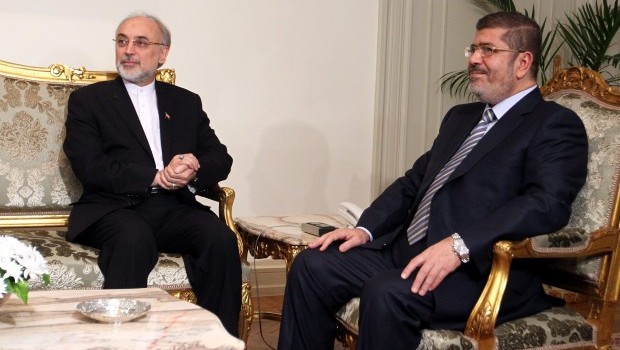Last Thursday, the Lebanese daily newspaper Al-Akhbar—an Assad regime and Hezbollah-affiliated newspaper—anonymously cited an official who stated that the Syrian president is ready to restore relations with the Muslim Brotherhood government in Egypt, as the stance of the post-revolutionary Egyptian government has become closer to that of Iran.
In a way not new to the Assad regime and its allies, who push forward their ideas through affiliated media outlets, the newspaper quoted the official as saying that the regime welcomes Cairo’s decision to return to perform its regional role. The official claimed that Assad is ready to reopen “[diplomatic] venues with Egypt so as to restore normal relations [between the countries] and that Assad is giving Iran the green light to proceed in that direction, considering that such a step could blockade the Turkish role.” The anonymous official added that Tehran and Damascus seem to agree that Cairo “is extremely annoyed with the Turks and the Qataris, and is ready to seriously reconsider its past stances towards Iran and Syria. Moreover, the Egyptian leadership is ready to reconsider its domestic policy—namely, its relations with Al-Azhar and the opposition parties. Tehran is ready to play a role in this regard by providing the Brotherhood with all the expertise required for rebuilding the state.” In an attempt to explain himself, the Syrian official claimed that what makes this rapprochement possible is Egypt’s conviction that it deserves to be the leader of the region, and that “Iran is nothing but a Shi’ite minority compared to the Sunni majority. Thus, Egypt’s willingness to normalize relations with Iran stems from its conviction that Tehran will not deal with Cairo in an arrogant way, nor will it seek to hijack its role.”
One might ask how can we take these statements, which come from an official the newspaper did not name, so seriously. How can we understand the Egyptian Brotherhood’s insistence that the solution in Syria necessarily requires the involvement of Iran, which contributes to Assad’s crimes by providing him with money, fighters and weapons? How can we understand the Iranian president’s repetitive and public statements about how Egypt and Iran regard the Syrian crisis the same way, with no Egyptian official explaining to us on what they agree and disgree? Besides, how does the Brotherhood stand on what Hezbollah is doing in Syria, specifically in Al-Qusayr? How does the Brotherhood view the statements Nasrallah made on Thursday, and particularly his announcement that he sides with Assad’s regime, considering his fighters who are killed in Syria as martyrs and the Syrian revolutionaries as Takfiris (apostates)?
These are serious questions that require serious answers. If the Assad regime’s statements are hallucinations, the Brotherhood must provide answers to these questions so as to bring the dictator back to reality. It does not make any sense to criticize the US’s leniency when Assad declares his willingness to open up to Egypt. Besides, after Assad’s use of chemical weapons against his own people, the Egyptian Brotherhood’s position remains foggy. Is there really anyone who can answer these questions?
